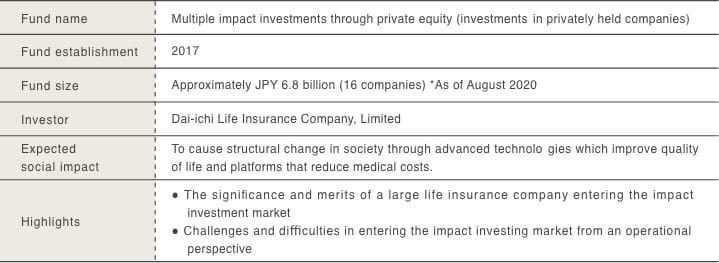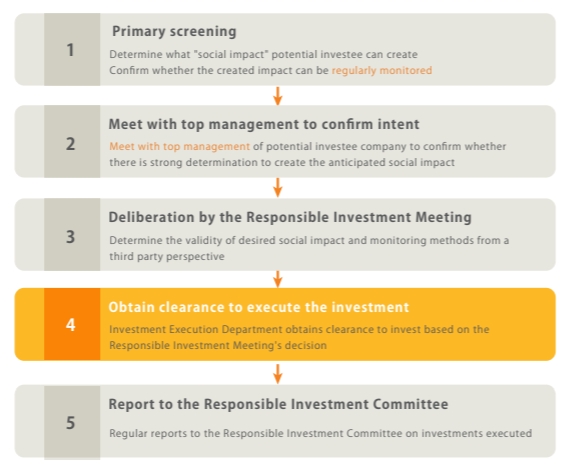Case
Summary
The Dai-ichi Life Insurance Company, Limited began impact investing in several privately held companies and other companies in fiscal 2017. This is the case of a major life insurance company in Japan having entered into the impact investing market for the first time, aiming to secure profits from a medium- to long-term perspective and solve social issues at the same time as an institutional investor with a wide range of assets (universal owner).
Overview

* Universal owners are investors who have huge investment assets and make diversified investments in a wide range of assets and securities. As universal owners make widely diversified investments, they tend to seek not only the performance, growth, and stock price of individual portfolio companies, but also the stability and soundness of financial markets and sustainable economic and social growth.
Fund Scheme
The Dai-ichi Life Insurance Company, Limited is a major life insurance provider in Japan, with a total asset balance JPY of roughly 36 trillion (as of the end of March 2020). It became a Principles for Responsible Investment (PRI) signatory in November 2015 and started the process of building a system for ESG integration.
In 2017, it set up ESG-themed investments and began their impact investing practices that incorporated a social impact measurement in their investment screening process.
The project’s impact investing process and investment overview are as follows.
Impact investing process

| Company name | Amount invested | Company overview | Expected social Impact |
|---|---|---|---|
| Gojo and Company, Inc. | JPY 1.0 billion | Microfinancing in developing countries | Improved access to financing in developing countries |
| Spiber Inc. | JPY 1.0 billion | Research and manufacturing of next-generation synthetic bio-materials (such as spider silk) | Reduce environmental load (cutting greenhouse gas emissions) |
| CureApp, Inc | JPY 1.0 billion | R&D and provider of a treatment app for nicotine addiction treatment | Decrease in number of patients; longer, healthy life expectancy; reduction of medical costs |
| CROWD CREDIT, Inc. | JPY 100 million | Offers loan-type crowdfunding services to enterprises in developing country | Promote business activities in developing countries; job creation |
| SUSMED, Inc. | JPY 100 million | R&D of a smartphone app to treat insomnia | Decreased risk from insomnia-related side effects; reduction of medical costs |
| Meltin MMI | JPY 300 million | R&D of an avatar robot with the world’s preemptive “most human-like hand” and related technologies | Decreased risk of workplace injuries in high-risk environments |
| MOLCURE, Inc. | JPY 100 million | Develops and provides the world’s first antibody discovery platform | Shorten the development time of antibody drugs; reduction of medical costs |
| QD Laser, Inc. | JPY 300 million | Develops and provides the world’s first eyewear that employs state-of-the-art laser technology | Improved quality of life for patients with limited vision |
| Challenergy Inc. | JPY 200 million | Develops wind turbines capable of generating electricity even in typhoons | Provide stable power supply in areas such as remote islands and reduce environmental load (cutting greenhouse gas emissions) |
| Venture fund managed by Energy & Environment Investment, Inc. | JPY 1.0 billion | Venture fund focusing on the environment and energy sectors | Reduce CO2 emissions |
| NeuroTrack Technologies, Inc. | JPY 800 million | Develops apps such as “Neuro Track Cognitive Function Test,” which measures cognitive functions by eye tracking | Prevention of dementia and reduction of healthcare cost |
| Integral Geometry Science Co., Ltd. | JPY 200 million | Develops a visualizing system for the early detection of breast cancer | Reduction in the breast cancer fatality rate through the early detection of breast cancer |
| UniFa Co., Ltd. | JPY 300 million | Develops and provides solutions utilizing IoT and AI toward realizing smart nursery care centers | Resolving the lengthy nursery care waiting list problem |
| Life is Tech, Inc. | JPY 200 million | Develops and provides IT and programming education services for middle and high school students | Solving the IT talent shortage |
| Toyonaka City’s anti-smoking social impact bond | JPY 12 million | Anti-smoking project operated by the Toyonaka Municipal Government and the world’s first anti-smoking social impact bond | Extending healthy lifespans |
| Modulus Discovery, Inc. | JPY 200 million | Develops drugs based on computational chemistry | Realizing accessible healthcare for all |
| Total | JPY 6.8 billion |
Highlights and Key Takeaways
- 1) Entry into the impact investing market by a major life insurance company
The Dai-ichi Life Insurance Company, Limited is one of the top institutional investors in Japan with a total assets balance JPY of roughly 36 trillion. As a universal owner of a wide range of assets with a medium- to long-term view, it positions ESG investment as a pillar of its asset management. This initiative is based on its investment policies and is the very first case in Japan that a major life insurance company has entered into impact investing market in earnest.
2)Investment utilizing expertise and business model as a life insurance company
At The Dai-ichi Life Insurance Company, Limited, impact investing is viewed as an opportunity in which the company can apply their expertise in insurance, healthcare, and fintech. In this project, the need for quick exit strategies is low under the insurance business model, and the strength of an insurance company that can make investments from a long-term perspective is leveraged.
- 3)Building a consensus at an operational level and a company-wide promotion system
Before entering into the impact investing market, The Dai-ichi Life Insurance Company, Limited reviewed numerous definitions adopted by organizations around the world to define impact investment and its meaning within the company.
When investing, the front office staffs who are well-informed on the potential investee and the Investment Planning Department hold discussions, at times sitting down with the owner of the investee, on the desired outcome or success indicators.
In addition, the president expresses the company’s commitment to ESG investing, and is also active in introducing impact investing.
One of the characteristics of this project is that a consensus has been formed at an operational level on the definition and performance indicators for impact investing, and the company-wide effort is progressing.
Related ArticlesVIEW MORE
- Case
- Impact Investments by The Dai-ichi Life Insurance Company, Limited through Private Equity (Investments in Privately Held Companies)

